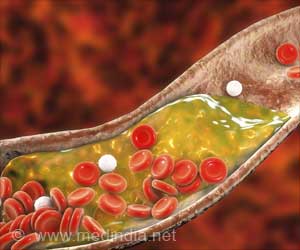New study explores the link between calorie restriction (eating less or fasting) and delayed vascular aging which may decrease the occurrence and severity of heart disease.

‘β-Hydroxybutyrate is a small molecule that is produced during fasting and can delay vascular aging which in turn reduces occurrence and severity of diseases related to blood vessels.
’





"Age is the most important so-called risk factor for human disease. How to delay aging is a significant pathway to reducing the incident and severity of human disease."The most important part of aging is vascular aging. When people become older, the vessels that supply different organs are the most sensitive and more subject to aging damage, so studying vascular aging is very important. This study is focused on vascular aging, and in old age, what kind of changes happen and how to prevent vascular aging."
In this study, the research team explores the link between calorie restriction (eating less or fasting) and delaying aging, which is unknown and has been poorly studied.
The researchers identified an important, small molecule that is produced during fasting or calorie restriction conditions. The molecule, β-Hydroxybutyrate, is one type of a ketone body, or a water-soluble molecule that contains a ketone group and is produced by the liver from fatty acids during periods of low food intake, restrictive carbohydrate diets, starvation and prolonged intense exercise.
"We found this compound, β-Hydroxybutyrate, can delay vascular aging," Zou said. "That's providing a chemical link between calorie restriction and fasting and the anti-aging effect. This compound can delay vascular aging through endothelial cells, which line the interior surface of blood vessels and lymphatic vessels. It can prevent one type of cell aging called senescence, or cellular aging."
Advertisement
Also, the researchers found when β-Hydroxybutyrate binds to a specific RNA-binding protein; this increases the activity of a stem cell factor called Octamer-binding transcriptional factor (Oct4) in vascular smooth muscle and endothelial cells in mice. Oct4 increases a key factor against DNA damage-induced senescence, which can keep blood vessels young.
Advertisement
"This stem cell factor (Oct4) could be a pharmaceutical or pharmacological target for slowing down or preventing aging. Then, if the vascular system becomes younger, it is less likely to have cardiovascular disease, Alzheimer's disease, and cancer because all of these diseases are age-related."
In the future, the researchers would like to target senescent cells with the goal of eliminating them and rejuvenating the vascular system to prevent cardiovascular disease.
Source-Eurekalert













